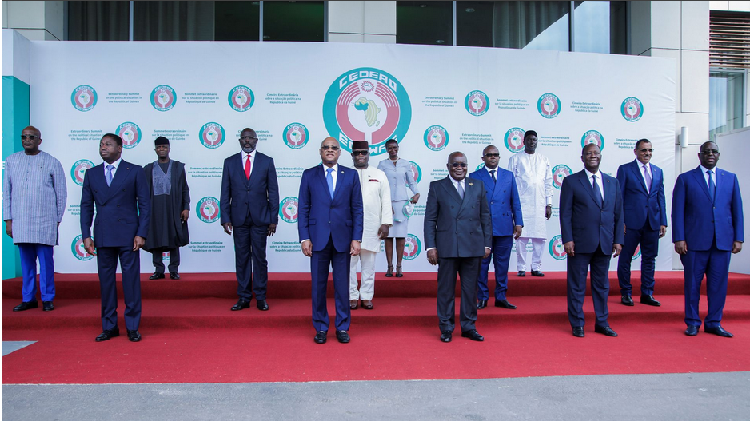The imposition of the sanctions by ECOWAS is the bloc’s toughest response yet to a run of military takeovers.
The Economic Community of West African States (ECOWAS), on Sunday, hardened its stance against military rule in Mali and Guinea, imposing new sanctions and calling on both countries to honour timetables for a return to democracy.
The imposition of the sanctions is the bloc’s toughest response yet to a run of military takeovers.
The move was agreed at an ECOWAS extraordinary summit of the authority of Heads of State and Government held Sunday in Accra, Ghana.
ECOWAS said in a statement it resolved that in “conformity with the decision taken on 16th September 2021, the Authority decides to impose sanctions with immediate effect against individuals and groups who have been identified, including the entire transition authorities and the other transition institutions.”
The sanctions include travel bans and asset freezes on all members of the transitional authority as well as certain family members, the statement said, adding that ECOWAS would consider additional sanctions in December if no progress is made.
Mali’s interim government, which took power following the military’s overthrow of President Ibrahim Boubacar Keita in August 2020, had promised to oversee an 18-month transition back to democracy culminating in elections on February 27, 2022.
But, they made a U-turn informing ECOWAS “of their inability to meet the transition deadline of February 2022.”
The West African bloc first imposed sanctions, including border closures, immediately after last year’s coup but lifted them less than two months later after the coup leaders agreed to the 18-month transition.
In October, Mali expelled ECOWAS special envoy to Bamako, accusing him of “actions incompatible with his status”.
Experts said Mali’s transition is seen as a key test of West African leaders’ commitment to protecting democracy against a return to the frequent putsches.
Last month, Sudanese acting Prime Minister, Abdallah Hamdok, was seized by a group of senior military generals. In September, Guinea’s military staged a coup, ousting longtime president Alpha Conde.
Guinea’s interim president, Mamadi Doumbouya, who led the coup, has promised a transition back to democracy but has not said when he will organise elections.
ECOWAS said it has appointed Ghanaian diplomat Mohamed Ibn Chambas as a special envoy to engage with Guinea’s transitional leaders.
It also “decided to uphold the suspension of the Republic of Guinea from all ECOWAS governing bodies as well as the travel ban and freeze on financial assets imposed on the members of the CNRD and their family members until constitutional order is restored” in the country.
The ECOWAS summit, attended by leaders from 13 countries called “on the African Union, the United Nations, and the bilateral and other multilateral partners to endorse and support the implementation of these sanctions.”
At the summit, Nigeria’s vice president, Yemi Osinbajo, said that African countries have gone far beyond military coup as a means of changing political actors and that coups are unacceptable.
He added that ECOWAS Heads of State and Government will continue to prevail on the military juntas in Guinea and Mali to return their countries to democratic rule.
READ ALSO: Trump hits Christie after he calls on Republicans to move past ‘2020 Election Fraud’ claims
Mr Osinbajo said Head of States “must insist, that other international bodies: the UN, EU, and other regional groups must support the impositions of sanctions on individuals and groups that choose not to follow the democratic process of change of government and choose to go by way of coup de‘tat.”
Referring to the situations in Guinea and Mali, the Nigerian vice president said “it appears from all indications that much progress has been made in Guinea, although we are still concerned that there ought to be much more clarity on transition.”
“But Mali is a much more difficult situation, there is much concern because very little progress has been made,” the vice president said.














